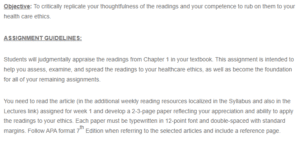Critical Reflection Paper – Healthcare Ethics
In Chapter 1, Theory of Health Care Ethics of the book Health Care Ethics: Critical Issues for 21st Century, Eileen E. Morrison and Beth Furlong introduce the reader to the theoretical background of major theories in healthcare. The modern healthcare professional is expected to develop solutions shaped to fit the problems of a dynamic modern healthcare environment. Every day, these busy healthcare professionals are expected to make difficult decisions that may be reasonable but may conflict with the existing ethics. Morrison and Furlong (2019) provide a clear understanding of the ethical foundations that can guide healthcare professionals in making decisions and defending ethically made decisions in ethically challenging situations. Overall, for an individual working in a biomedical field who is majorly predisposed to various ethical conflicts, Chapter 1 creates an understanding of the theoretical foundations of ethics which help them overcome most ethical challenges in the field.
Critique
From a personal view of Chapter 1, Morrison and Furlong (2019) have well-presented how and why theories of healthcare ethics are the foundations of understanding and applying ethics in healthcare. The chapter provides a good overview of the different ethical theories and how each theoretical perspective influences ethical practice. For instance, I now understand how different theoretical perspectives, such as deontology, virtue, and egoism, differ in their approaches to the definition of what is ethical and unethical. I also understand how to apply these different perspectives to overcome varied ethical dilemmas.
The ethical foundations are either normative ethics or metaethics. Both outline various approaches that enable healthcare professionals to understand and apply ethical concepts and theories to define and differentiate right from wrong. A relative perspective of ethics is that there is no single absolute ethical theory. Regardless of whether decisions are guided by authority, virtue, moral duty, and ego, all decisions in healthcare must be based on practical knowledge and existing ethics for the benefit of the patient (Varkey, 2021). As an individual working in healthcare, the types of ethics I can apply in practice and guide my decisions towards care are virtue and deontological ethics. I can apply both in caring for the patient as a moral duty and also behave accordingly as the patient’s caregiver.
My view of the key features of Natural Law is its assumption of the rationality and orderliness of nature. This means as a healthcare professional and a human, I am naturally rational, meaning that I can easily distinguish between right and wrong and observe order while making decisions.
The Deontology Theory relates morals to choices and actions. The major principle of the Deontology Theory is that regardless of how good an outcome of a choice is, certain choices are not morally allowed. In this case, my future career based on the Deontology Theory will require making decisions not based on how beneficial an outcome is but on how moral the process is.
Further, the principles of ethics include autonomy, beneficence, nonmaleficence, and justice. All of these ethical principles apply to my professional and personal life. For example, based on the principles of beneficence, justice, and nonmaleficence, I ensure that I treat my clients and colleagues justly and focus on reducing activities that do not benefit my physical and mental health and risk self-harm.
Conclusion
In conclusion, the chapter has helped me understand and appreciate how the theories of ethics form the foundation of an ethical healthcare system. The theories of ethics create base support for individuals, organizations, and society, who are the pillars for upholding ethics in healthcare. The theoretical foundations of ethics support the pillars of decision-making and the solution of ethical issues within the healthcare system.
References
Morrison, E. E., & Furlong, E. (2019). Health care ethics: Critical issues for the 21st century (4th ed.). Jones & Bartlett Learning.
Varkey, B. (2021). Principles of Clinical Ethics and Their Application to Practice. Medical Principles and Practice: International Journal of the Kuwait University, Health Science Centre, 30(1), 17–28. https://doi.org/10.1159/000509119
ORDER A PLAGIARISM-FREE PAPER HERE
We’ll write everything from scratch
Question
Objective: To critically replicate your thoughtfulness of the readings and your competence to rub on them to your health care ethics.

Critical Reflection Paper – Healthcare Ethics
ASSIGNMENT GUIDELINES:
Students will judgmentally appraise the readings from Chapter 1 in your textbook. This assignment is intended to help you assess, examine, and spread the readings to your healthcare ethics, as well as become the foundation for all of your remaining assignments.
You need to read the article (in the additional weekly reading resources localized in the Syllabus and also in the Lectures link) assigned for week 1 and develop a 2-3-page paper reflecting your appreciation and ability to apply the readings to your ethics. Each paper must be typewritten in 12-point font and double-spaced with standard margins. Follow APA format 7th Edition when referring to the selected articles and include a reference page.

